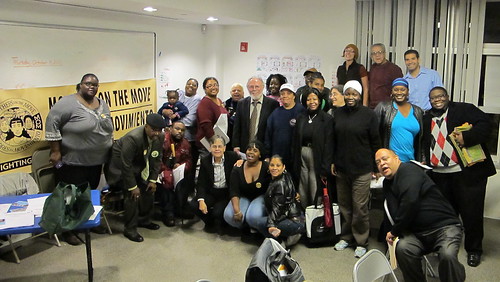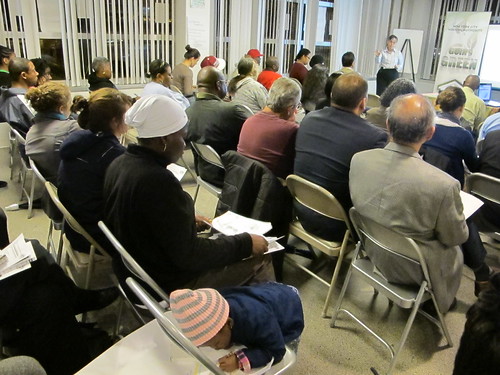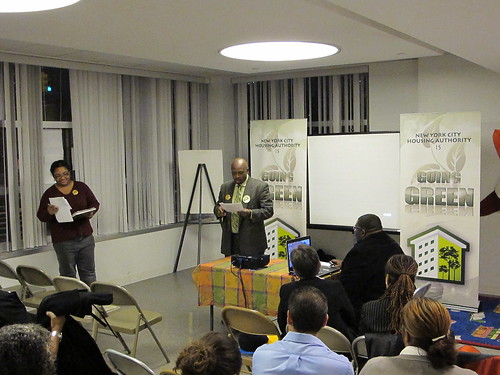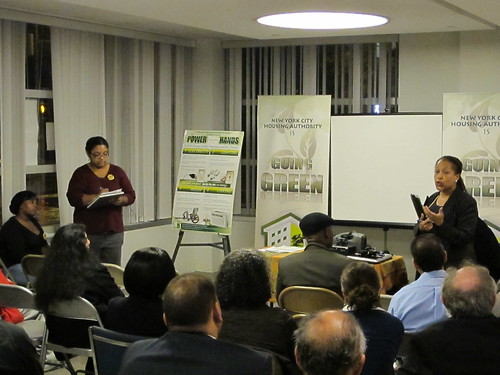
On Thursday, October 14, Mothers on the Move hosted a Town Hall Meeting to learn more about NYCHA's Green Agenda for public housing. 55 people attended, with a good mix of local public housing residents, service providers and allies from the Bronx Green Jobs Roundtable in attendence.
NYCHA Green Commissioner Margarita Lopez gave an in-depth report on the challenges and long-term benefits associated with moving NYCHA toward more energy-efficient, sustainable housing solutions for working class and low-income New Yorkers.

Some details of Ms. Lopez' presentation:
- Systematically change every lightbulb and fixtures, thus creating jobs
- The example of Castle Hill Houses in the Bronx, where average pay was $43.00/hour for ‘greening’ measures-changes they made - these have included installing instanteous water heaters, adding new boilers (old ones were only 55% efficient, new are 90% efficient), planting trees and installing apartment temperature sensors
- All this creates jobs- field coordinators, steam fitters, painters, laborers, electricians
- Creation of a “green committee’ at each development to help implement green initiatives, educate neighbors and serve as a resource
- Long term goals include: geothermal buildings, solar panels (feasibility study with CUNY) and making money from recycling programs
Michelle Pinnock, NYCHA's Senior Advisor for Resident Economic Empowerment & Sustainability, gave a brief outline of NYCHA's Section 3/Resident Employment Program (REP). Section 3 is existing Federal HUD regulation requiring Public Housing Authorities to put roughly 30% of HUD funds toward job development opportunities. Ms. Pinnock's presentation
- Section 3 is an unfunded mandate - a funding stream is needed to provide sufficient training to residents. In addition, the “greatest extent feasable” language allows a lot of leeway for Housing Authorities to treat Section 3 as optional and not to comply.
- Privately funded office through the Robin Hood Foundation (her office prepares people for future positions, refers people to GED programs, they also have hotline)
- NYCHA created the Resident Employment Program (REP) to “give teeth to Section 3”
- REP large contracts (over $500,000) stipulate that 15% of labor costs have to go to NYCHA residents. The current focus has been on construction projects, but the goal is to shift that to make REP a requirement on all or most projects
Goal - 150 participants this first year (with 75 placed in jobs)- 1,000 total for 500 jobs (perhaps over the next several years??)
- Unpaid, but provide metrocard and lunch
- Requirements for participation: Must be a resident on lease, have no criminal history to be hired by NYCHA (not to just participate in program0. Education requirements (they only refer people to places to get GED help)
- Track 1- basic construction, 8-week training, job placement assistance, 1st class entering third week, 2nd class for women-working with NEW
- Track 2- janitorial track, 1st cohort beginning of November
Overall the plan seems to be coming from the right place, with good intentions and an understanding that the crisis in housing, unemployment and the environment are deeply connected and have intersecting solutions.
MOM looks forward to working with NYCHA to developing resident-led solutions, and to ensuring implementation and accountability so that increasing numbers of local residents benefit from job training and placement dollars available to NYCHA and other agencies.

Big shouts to MOM leaders Luisa Escalera and Matthew Welch for providing excellent facilitation of the meeting and laying out MOM's preliminary recommendations for a NYCHA Green Jobs Pilot Program. MOM Luisa and Mathew are part of the MOM Green Jobs leadership committee that conducted a survey this year on resident perspectives on NYCHA employment programs and green job opportunties. MOM will be releasing a report on these findings in the coming months - stay tuned!


More photos from the meeting - HERE




